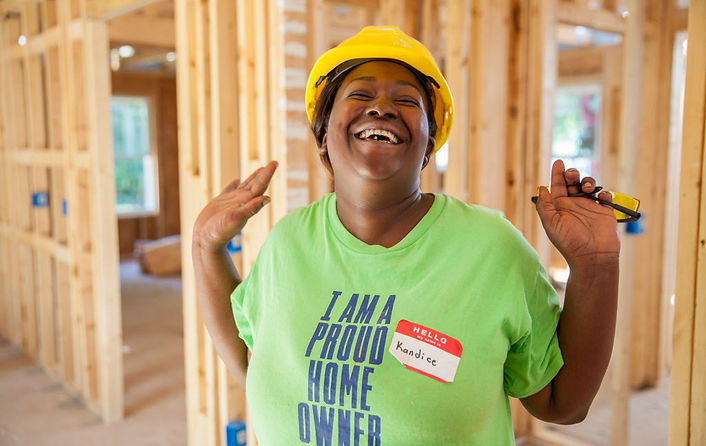
Homeownership Program


Habitat believes in affordable mortgages so that everyone
can achieve the dream of homeownership!
To qualify for Habitat applicants have to complete financial training, 350 hours of "sweat equity" helping to build their home. In addition to meeting certain income requirements, applicants must be in need of affordable housing, willing to partner with Habitat and able to pay an affordable mortgage. Habitat Homeownership is a lottery system and not everyone who applies will be selected.
Habitat follows a nondiscriminatory policy in line with the Fair Housing Act and Equal Credit Opportunity Act. Race, sex, color, national origin, religion, familial status, age, marital status, disability and income from public assistance are not a factor in choosing homeowners.
Dalton Requirements to Apply:
You must live and work in Whitfield County (for 2 or more years), be able to pay an affordable mortgage payment, pass a background check, pass a drug screening, and complete a financial training course before you are eligible to apply.
Eligible homebuyers must be:
In need of safe, affordable housing
Applicants may be dealing with substandard housing that is poorly built, damaged or inadequate; rent or mortgage that’s greater than 30% of their gross monthly income; unhealthy living conditions such as homes with mold and asthma triggers; or a home that is inaccessible for their disabilities.
Low- to moderate-income
For U.S. applicants, household income must not exceed 60% of the area median income,which is defined annually by the U.S. Department of Housing and Urban Development. You can find the median income of your area and for your family size using the query tool from HUD’s Office of Policy Development and Research.
Willing to partner with Habitat
Once selected, homebuyers must partner with Habitat throughout the process. This partnership includes performing “sweat equity,” or helping to build their own home or the homes of others in our homeownership program. Sweat equity can also include taking homeownership classes or performing volunteer work in a Habitat ReStore.
Homebuyers also participate in homeowner education classes, which provide a mix of hands-on and classroom learning. The courses cover home maintenance and repairs as well as saving, managing a mortgage and maintaining personal finances. Each class is crafted to help empower participants to be successful homeowners.
Able and willing to pay an affordable mortgage
Mortgage payments are cycled back into the community to help build additional Habitat houses.

What is sweat equity?
Sweat equity is a term used often when talking about the creation or building process. It’s about doing the work — the hard work — to bring an idea to life.
Eight ways families put the “sweat” in sweat equity with Habitat
-
Performing construction work on their home or another family’s home. Common activities can include framing or raising walls.
-
Clearing debris from build sites to make way for new construction.
-
Volunteering in the ReStore.
-
Writing thank you cards to local donors or filing or performing other administrative tasks.
-
Children can also sometimes contribute to the family’s sweat equity by earning good grades in school. Awarding one hour of sweat equity for every “A” that a child earns.
-
Participating in homeowner classes. Throughout the process of purchasing their home, future homeowners can earn sweat equity credit as they learn about their mortgage, insurance, maintenance, home safety and more.
-
Documenting a disaster preparedness plan
Homeownership Information Request
Please complete the form to receive updates regarding open application periods and requirements.